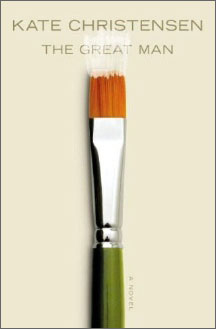 |
 Kate Christensen
Kate Christensen
The Great Man
Reviewed by: Rick Kleffel © 2007
Doubleday / Random House
US First Edition Hardcover
ISBN 978-0-385-51845-1
307 Pages; $23.95
Publication Date: 08-14-2007
Date Reviewed: 09-27-2007
Index:
General Fiction
Each day of our lives, we distill ourselves a little bit more. We filter out those people in our lives who are not essential. We find ways of living that fit our inclinations and abilities more perfectly, carefully sanding away the things that do not suit us. This is not to say that we become happier or better adjusted to the world, any more than a pot of coffee left on a warmer becomes better coffee. The strengths and weaknesses of the coffee are enhanced. It's stronger but more bitter.
The four women left behind by Oscar Feldman — 'The Great Man' of Kate Christensen's new novel — have spent the years of their lives since his death in distillation. Teddy St. Cloud, his long-time mistress and mother of his two daughters, lives in genteel poverty and good spirits. Lily Emerson, Teddy's best friend, wants to start dating. Abigail Feldman, his wife and mother of his autistic son Ethan, spends her days in isolation and routine. Maxine Feldman, his sister and an artist of perhaps greater talent than her more famous brother chain-smokes and paints. Now well beyond anything that might be called middle age, this quartet of elderly women find themselves re-creating the man who drew them together at the behest of not one but two writers hoping to craft biographies of Oscar Feldman. Feldman was a womanizing artist who painted only female nudes when his contemporaries were spinning off into Abstract expressionism. Nice work if you can get it.
Christensen's new novel is a compelling and unique look at four women the reader will come to love as much as the author does. She shows us the details of elderly women's lives with an unsparing eye that revels in the very things about the aged that make us uncomfortable, even if we ourselves are aged. Teddy, Abigail, Maxine and Lily are the brilliantly blunt women who simultaneously shock, repel and entertain you. Yes, you’re going to feel uncomfortable at many of their revelations. But you won’t want to miss a word.
Character, dialogue and voice are very much the bilious, bitter beating heart of this book. No matter how discomfiting the situations, each of these women will seem as real and as loved to reader as members of their own family. Teddy is the through-line of the novel, the dominant voice who imperiously pronounces the opening salvo: "'It's amazing how well you can live on very little money.'" With prose that consistently steps beyond the boundaries of decent restraint, Christensen then goes on to demonstrate in detail just how well you can live on a restrained budget. She immerses the reader in Teddy and Lily's, then Abigail's, then Maxine's lives. Details that might make readers squirm are given the same loving attention devoted to details that might make you salivate. There's a sensual overlay at work in 'The Great Man', an immersion in everyday chores like cooking, or cleaning, or not cleaning, as the case may be. The reader in a sense becomes the great man, the one who knows why all these women are so powerfully important to the world.
Most of the novel consists of the women eating and sniping at themselves and at one another. Christensen writes about food with a skill that will have the reader looking for recipes, which can in fact be found on her website. She uses the same sensual skills in sex scenes that are funny, enchanting and erotic — not attributes one might expect in a novel where the average age of the characters is over 80. The prose is detailed and prickly, the dialogue witty. Most of the book veers between smirkingly and laugh-out-loud funny, with occasional grace notes of quietly observed precision. It is a novel written very much in a style the characters themselves would approve of privately and lustily lambaste in public.
Plot, such as it is, is provided by the only two sort-of men actually present in much of the book, the biographers. Henry Burke is a twerpy but intuitive married man, while Ralph Washington is more than a little prissy and not particularly observant. As each of them interviews the women, portraits of the artist as a horndog, utterly unencumbered by thoughts of anything other than his own satisfaction, emerge. Oscar Feldman proves to be something of a lout; moderately talented, totally selfish, but somehow smart enough to attract and even be related to utterly fascinating women. Bookended by a metafictional obituary of Feldman and a book review of the two biographies, 'The Great Man' is a novel that offers the sharpest, smartest portrait of women well past the second half of their lives you're likely to find in this youth-obsessed culture. To the reader's delight, "The Great Man" is much less than the sum of his women.
|
 |
